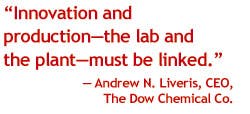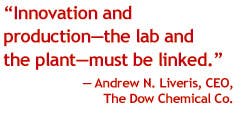The Manufacturer's Agenda: Tracking Manufacturing's Transformation
For the past few years, we -- our country, the manufacturing sector and IndustryWeek -- have been on a journey toward an increasingly better understanding of what it means to be a U.S. manufacturer. At the turn of the decade, as the manufacturing sector helped pull the U.S. out of a deep recession, our attention turned toward questions concerning the importance of "manufacturing" to the nation's economic growth.
Much of the discussion focused on production, the actual "making of things" on the factory floor, where crucial jobs that drove the economy in times past might once again be created. But even as we talked about the benefits -- to companies and the country -- of reviving factory work, research was revealing that our eroded production capacity had damaged our innovation capacity. Making things, we rediscovered, is an integral part of innovation.
Soon thereafter however, in December 2001, China's entry into the World Trade Organization changed the equation. U.S. manufacturers doubled-down on a strategy of offshoring the "low-value" production work, while keeping in-country the "high-value" R&D and innovation work. For the better part of the decade, IW and others cautioned manufacturing business leaders about the risks of the offshore strategy, specifically about the difficulties of maintaining innovation capabilities without the related production capabilities.
Follow @PPanchakIW for updates throughout the day.
The aftermath of the recession of 2008, which coincided with increasing labor costs in China, got manufacturing business and public policy leaders thinking again. Perhaps it was time to rebalance the strategy and return some production to the U.S.
For the past two years, IndustryWeek followed the creation of -- and pushed for manufacturers to accept -- a new definition of manufacturing, one in which production activities are an integral part of innovation.
We weren't alone. Numerous reports published in the past year have arrived at similar conclusions. Dow Chemical's CEO Andrew N. Liveris, himself an outspoken advocate of the importance of production and the author of Make It in America, summed up the growing consensus best:
"…manufacturing no longer only encompasses the work of 'making things.'
"Today, rather, the work of making things cannot be separated from the work of inventing them… and improving them… and developing the next generation of them. Companies cannot, anymore, invent a product in one country -- and build it in another. Innovation and production -- the lab and the plant -- must be linked."1
IndustryWeek takes this finding one step further, formalizing what we've believed all along: When we talk about manufacturing, we mean business. From that comes our new mission: Advancing the Business of Manufacturing.
| Ahead of Its Time: Read the September 21, 1998, IndustryWeek Special Report, The New Manufacturing, which got a lot of things right in describing manufacturing in 2014 and beyond. |
With this perspective, together we will find and share new strategies, insights and opportunities for building a successful manufacturing company -- and rebuilding the U.S. manufacturing sector.
1 From a speech delivered at Saginaw Valley State University’s 50th Anniversary Economic Summit; watch the video or read the full transcript.About the Author
Patricia Panchak
Patricia Panchak, Former Editor-in-Chief
Focus: Competitiveness & Public Policy
Call: 216-931-9252
Follow on Twitter: @PPanchakIW
In her commentary and reporting for IndustryWeek, Editor-in-Chief Patricia Panchak covers world-class manufacturing industry strategies, best practices and public policy issues that affect manufacturers’ competitiveness. She delivers news and analysis—and reports the trends--in tax, trade and labor policy; federal, state and local government agencies and programs; and judicial, executive and legislative actions. As well, she shares case studies about how manufacturing executives can capitalize on the latest best practices to cut costs, boost productivity and increase profits.
As editor, she directs the strategic development of all IW editorial products, including the magazine, IndustryWeek.com, research and information products, and executive conferences.
An award-winning editor, Panchak received the 2004 Jesse H. Neal Business Journalism Award for Signed Commentary and helped her staff earn the 2004 Neal Award for Subject-Related Series. She also has earned the American Business Media’s Midwest Award for Editorial Courage and Integrity.
Patricia holds bachelor’s degrees in Journalism and English from Bowling Green State University and a master’s degree in Journalism from Ohio University’s E.W. Scripps School of Journalism. She lives in Cleveland Hts., Ohio, with her family.


